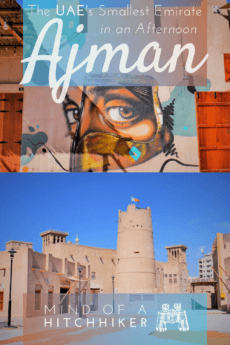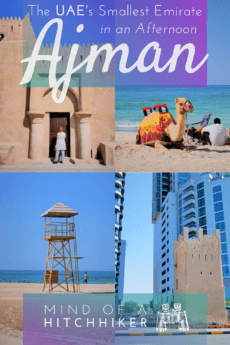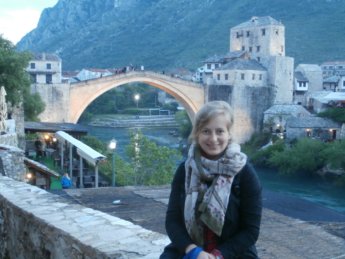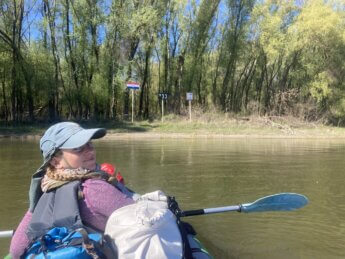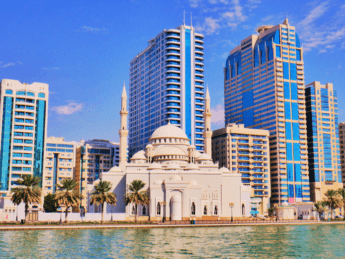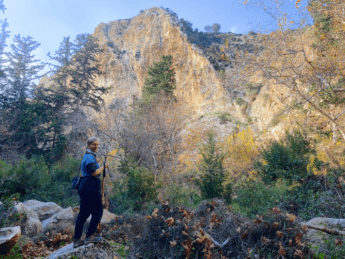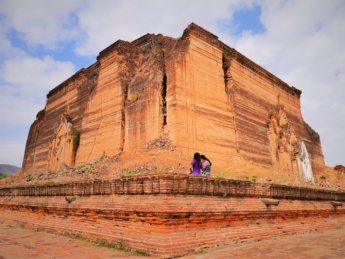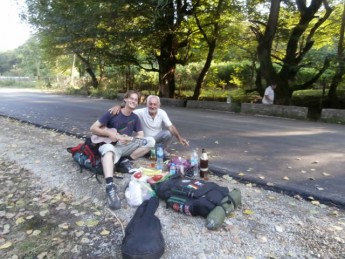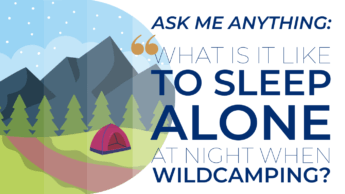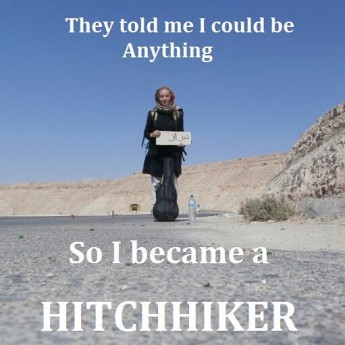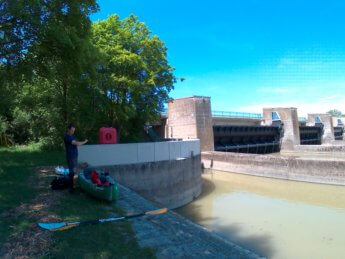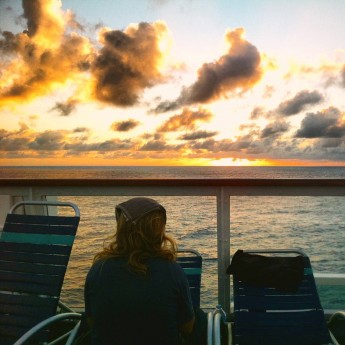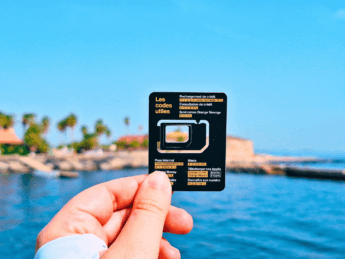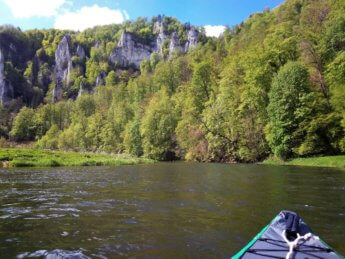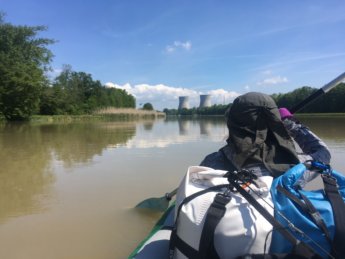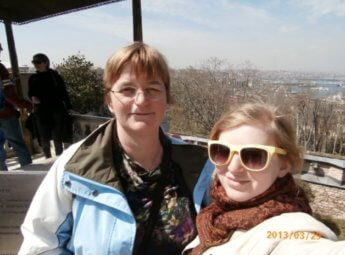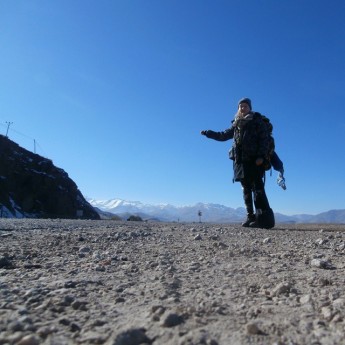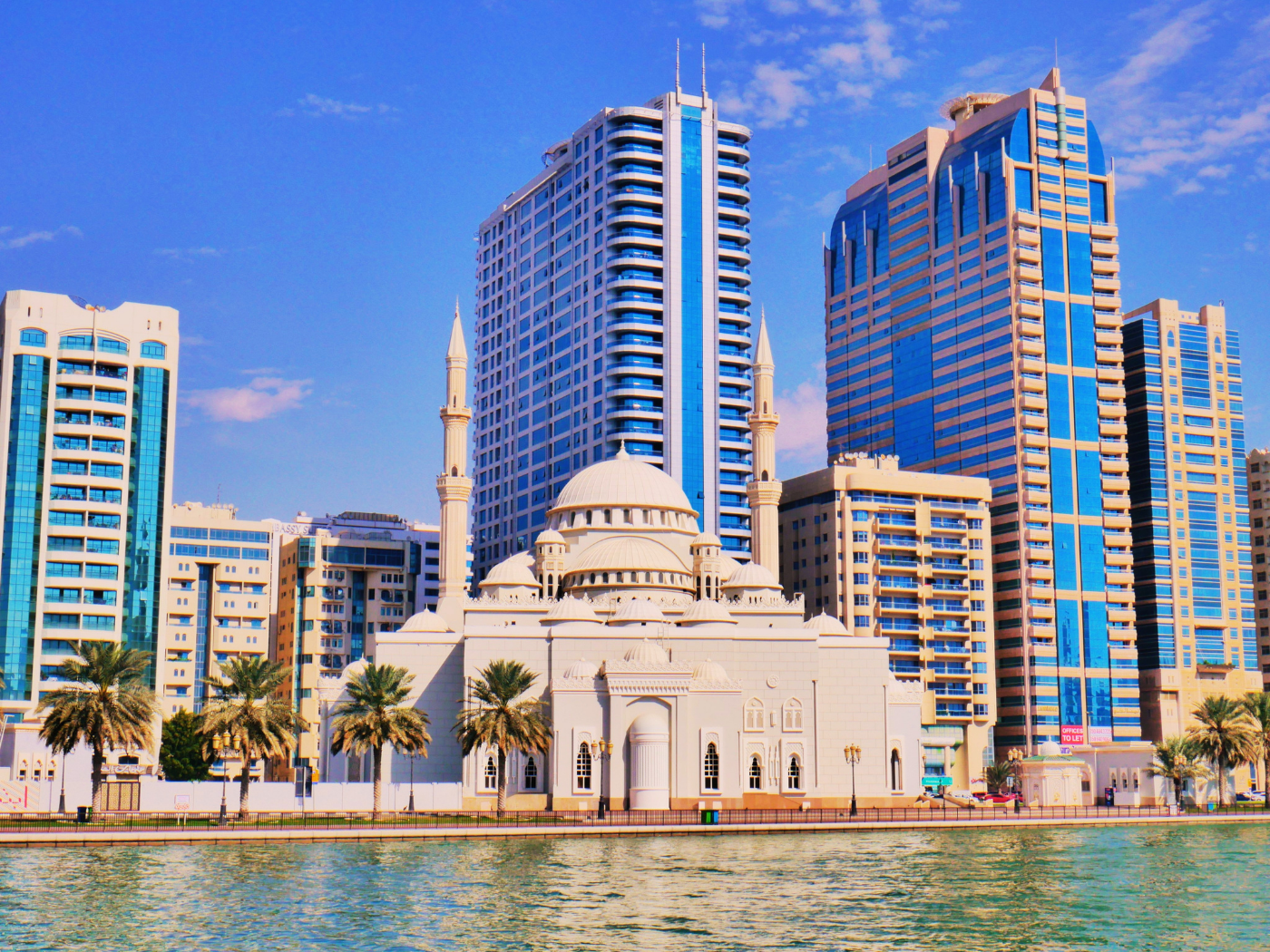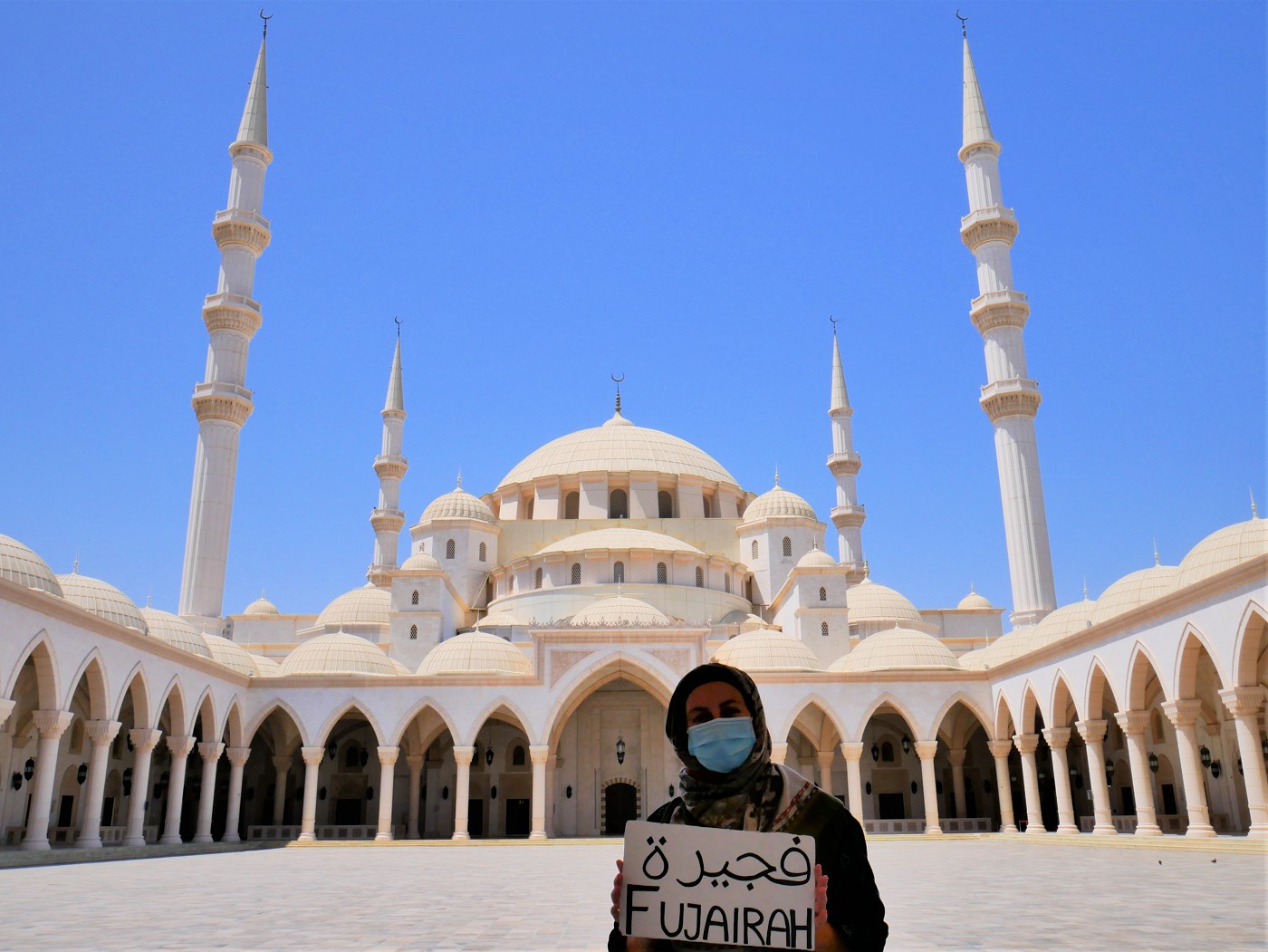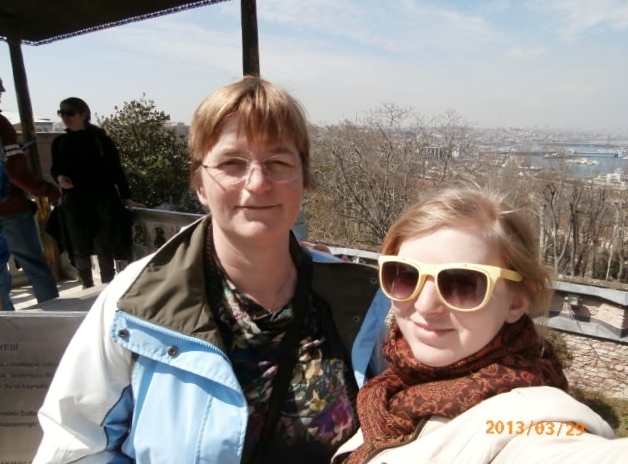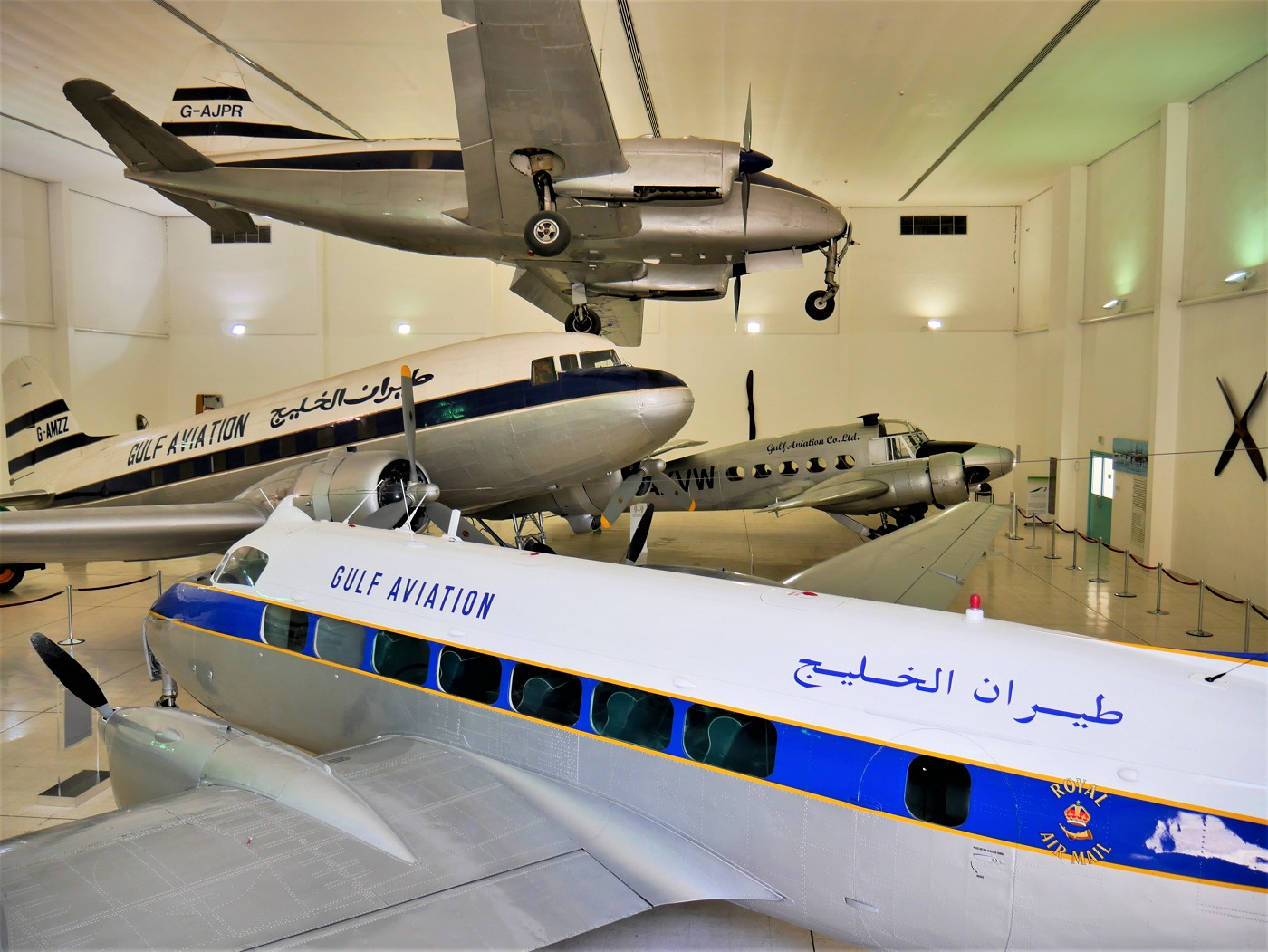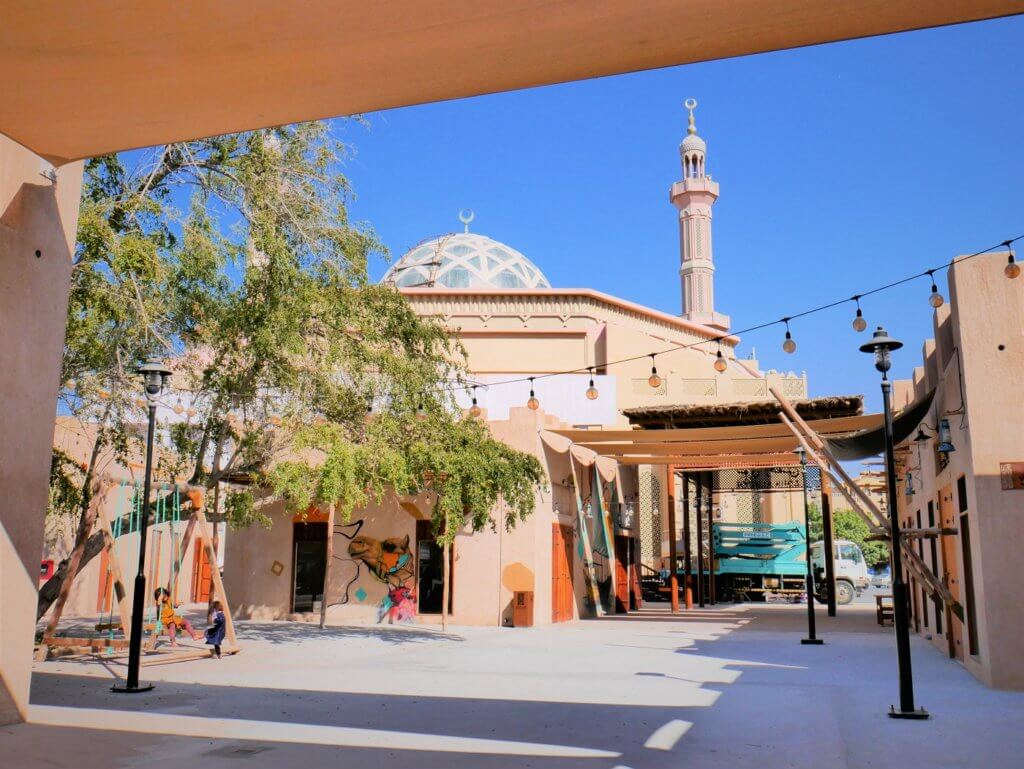
During our stay in Sharjah, we decided to take a day trip to Ajman (pronounced: ADZH-man). This was our third emirate out of seven. Even though it’s the smallest emirate, I think Ajman has enough to offer for a couple of days, depending on one’s interests and ‘disposable’ income. We visited Ajman on Monday the 22nd of February, 2021 on this 4.6-kilometer long walk.
Contents
Sharjah to Ajman
Our accommodation in Sharjah is only about 10 kilometers away from Ajman. Even though we prefer to stay in each emirate a couple of days, we couldn’t really find a good reason; the hassle of packing and moving to visit a place so close by trumps the cost of a taxi. So we organized a half-day trip to Ajman from the comforts of our place in Sharjah.
Ajman (عجمان) is the UAE’s smallest emirate (see ‘Ajman Polygon’ on map) and its capital is completely surrounded by Sharjah—similar to how Senegal completely surrounds the Gambia. It has two exclaves that I’d like to visit but are a little hard to reach when you don’t have a car: Manama (منامة ) and Masfout (مصفوت).
We looked up a couple of suggestions for things to do in Ajman and then plotted a walking route out of the things we liked. With a packed day bag, we stopped a taxi on the streets and asked for ‘Ajman corniche’. We’ve never heard and read the word ‘corniche’ as often as we have in the UAE; every coastal road with a pedestrian zone in the UAE is called that. We gave the driver our phones with Google Maps navigation to the Al Murabbaa Tower (برج المربعة). Again, the border between the two emirates was completely invisible.
Walking Ajman Corniche
I couldn’t really find anything on the history of this old tower, but it was a good place to start our walk from. It was already the afternoon, so the sun was hot and strong and the tower cast some nice shadows. The tower stands in the middle of the road, bending traffic around it slightly. I’m happy they saved this piece of history among all the shiny new things in the UAE.
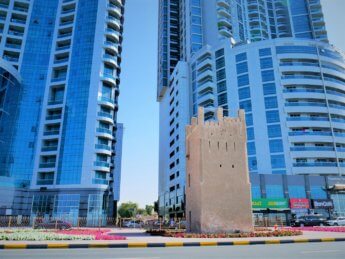
We crossed the road to the corniche, where there was a cute piece of street art confirming which emirate this is.
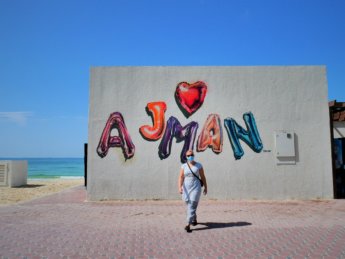
Then we analyzed the beach, which looked much better than the so-so beach we’ve visited in Sharjah. There were lots of people swimming, having a picnic, and doing sports in the sand in small groups. There was even a guy with a dressed-up camel on the beach, for photo ops or small rides.
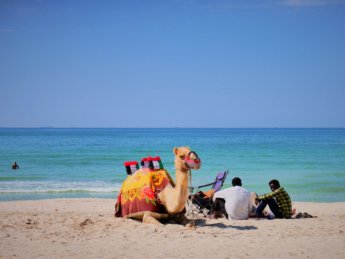
Places to smoke shisha lined were omnipresent. Sharjah is a dry state that forbids all alcohol (not just consumption) and even shisha. Next door in Ajman, one doesn’t need an alcohol license – like in Abu Dhabi and Dubai – to drink. Just because alcohol and shisha are a little more legal in Ajman doesn’t mean it’s ‘the liberal emirate’, as one might assume. The beach still encourages a conservative dress code – three times it says that on the sign – although enforcement doesn’t seem to happen, judging by the handful of women in bikinis. On the other hand, a beach sign also says the beach is closed.
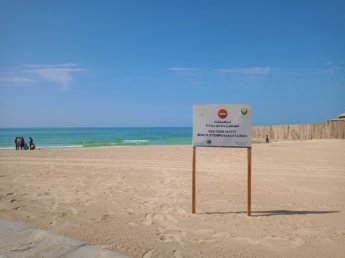
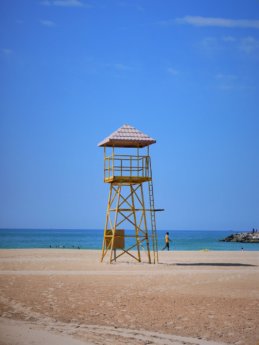
To the Center of Ajman
Then we took a right into the city. The walkability went down rather quickly, although it wasn’t much different from Sharjah. Sometimes, the sidewalk would be missing, which was a little annoying. We came across the Ethiopian restaurant that Jonas had found, but we weren’t hungry enough to justify sitting down and chomping down on some injera. We passed a driving school beginner’s terrain that was quite busy. It reminded me a little of Albania, which is where I saw more learner’s cars on the streets in towns than normal cars.
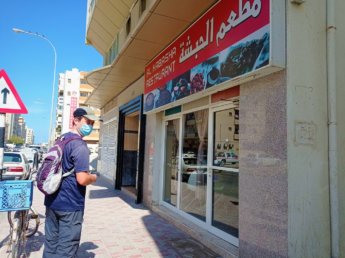
Once we hit the ‘zone of interest’ on Google Maps in Ajman’s city center, we were quite parched and downed a small bottle of water. It was good that we’d brought our hats. The streets were empty and most shops were closed, presumably because it was time to pray. We walked past the Ajman Gold Souq where all the windows were shuttered to hide the shiny.
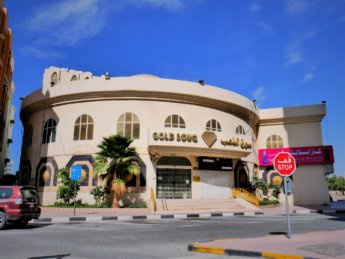
We crossed to the middle of the main thoroughfare (Sheikh Rashid Bin Humeed Street) and approached the dry fountain in the middle. It celebrates Ajman’s history as a shipbuilding place.
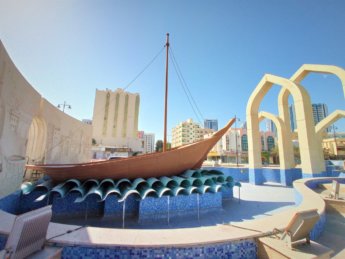
Ajman Heritage District
From here, it’s easy to see the old and ‘new old’ buildings of Ajman Heritage District; only the fort that houses the Ajman Museum is actually old, the rest are new constructions with an old look to house small businesses. They began this project in 2019 and it looks mostly finished. This is also where they put Ajman’s tallest flagpole. Tall flagpoles are something you’ll see in popular spots across all emirates.
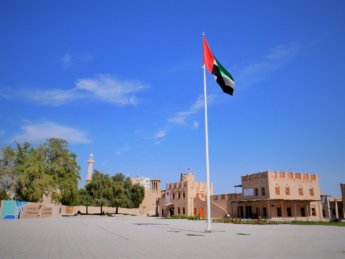
Across the street is the Ajman Bus Terminal in case one would arrive from Dubai by public transport. There’s a large square next to it with a mosque that functions as a prayer ground during Eid. There were some wrecked ships and ship models there that probably adorned the heritage district before COVID-19 killed tourism. One of the things we didn’t include in our itinerary today was visiting Ajman’s dhow shipyard, which is apparently quite spectacular. It’s quite far out of the way from the rest of the places we wanted to visit.
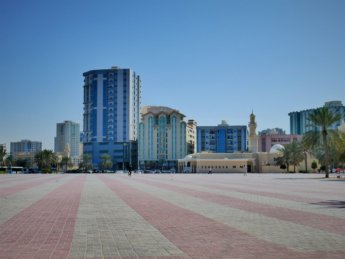
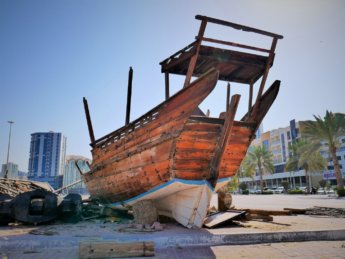
Back in the heritage district, we walked around and enjoyed the old with the new. I can’t help but wonder whether these heritage districts in the UAE – Al Seef in Dubai, Heart of Sharjah in Sharjah – exist only to celebrate history or also to satisfy an orientalizing need of (white, western) visitors. Nevertheless, these places are very enjoyable because of the walkability of their tiny sikkas and the cool shadows. One way to identify new old buildings is by seeing if there’s street art on them, which they’d never spray paint on the actual historical artifacts.
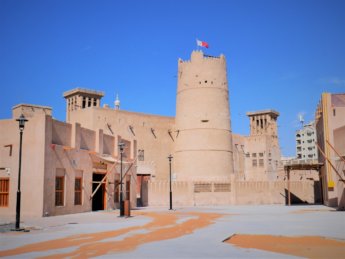
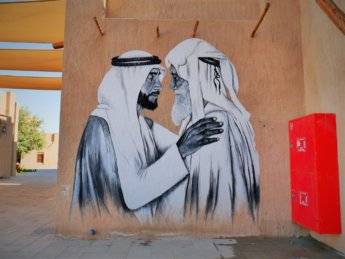
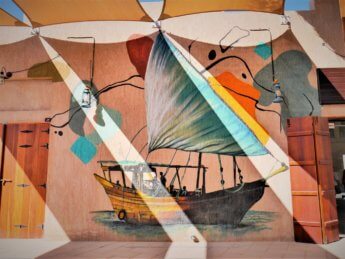
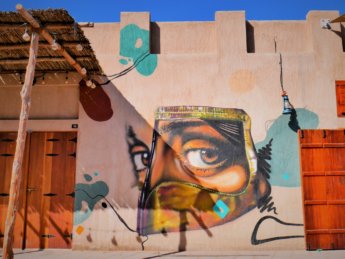
Jonas was a little relieved that the Ajman Museum was closed for renovation or covid or another reason since he grew quite tired during our last museum visit. Also, the sand-and-pink mosque in this area was under renovation.
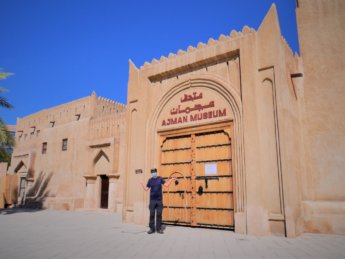
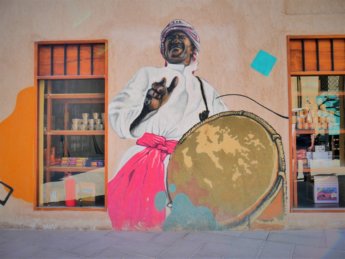
This area was also the only place where we encountered another group of tourists. Most people around the heritage district were construction workers and gardeners keeping the plants in a healthy condition. After walking around and satisfying our senses and photo ops, we wanted to have a cold drink somewhere. Even though there are many spaces for small businesses, most of them weren’t open (yet?). At last, we found one café in a new old building called Koub. It was very hip with its concrete floor.
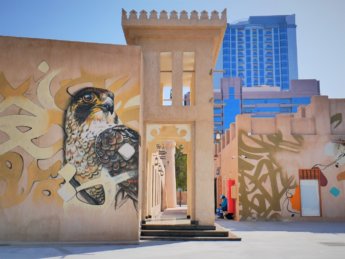
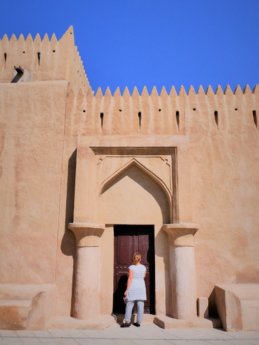
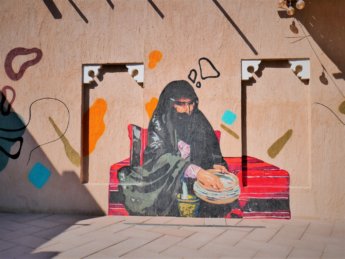
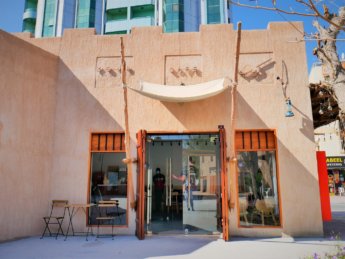
Ajman’s Marina
After the heritage district, we headed further north to the marina. I was taking a photo of a nice domed building – perhaps a former mosque? – when Jonas noticed that the weird looping road was full of driving school cars. One after the other, insecure drivers made their way through this abomination of a road. There was even someone training for their motorbike license who had a teacher on the back pointing at how to take this road.
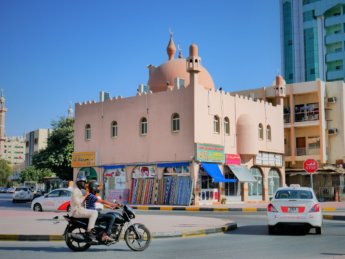
We were in need of some necessities to make dinner (Tunisian ojja), so we stopped at a supermarket to buy bread. Then we tried to find our way to the marina, during which we came past a very awesome-looking building behind a giant fence. We could only see the golden onion-shaped dome and the crenulated walls of the fort that surrounds it. I looked at my map and it didn’t tell me what was there. In fact, it kind of told me that nothing was there when clearly something was there. We concluded that it must be the Sheikh’s palace or some other Ajman government building.
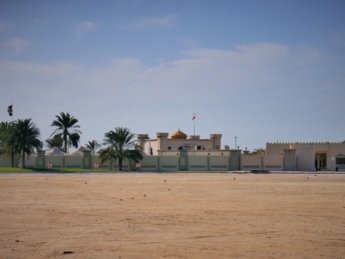
From there, we walked to the little inlet that’s part of Ajman Creek and the supposed marina. Perhaps it’s another project for the future since there were no boats except for one. There’s a boat restaurant there and on the land some new developments for restaurants and cafés. I wouldn’t have minded sitting down at another café, drinking something, and perhaps smoke a shisha, but Jonas wasn’t feeling it. So we walked the bouncy jogging track snapping nice pictures until the path ended rather abruptly at the start of a construction site.
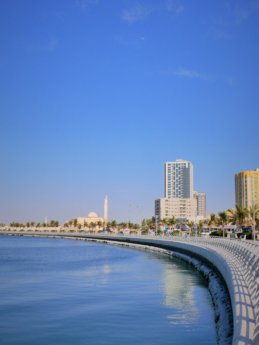
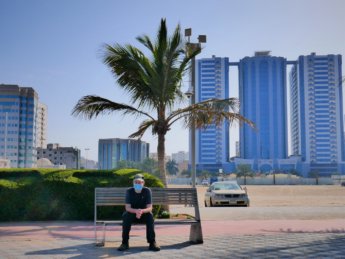
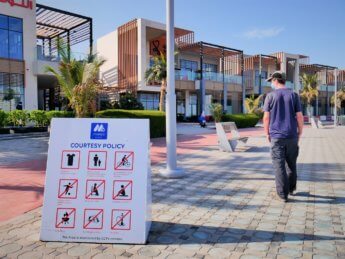
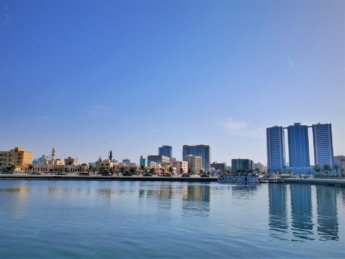
The creek showed the exit to the Gulf and there were a few boats in the harbor. There’s no bridge or tunnel to cross from this side of the creek to the other side where the Al Zorah mangrove kayaking is. So I assumed there would be abras or other marine transportation. However, we either didn’t see any or didn’t know what we were looking for. Or perhaps there isn’t enough demand to run abras across the creek during these times of low demand.
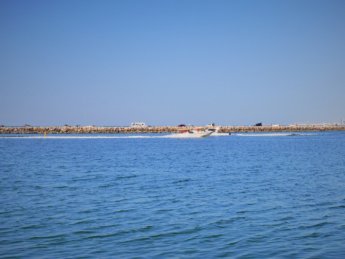
From here, we knocked on the window of a parked taxi to see if the driver wanted to drive us back to Sharjah. He did, and so we returned home at lightning speed. I think our entire minimal visit to Ajman lasted us only four hours. But I was satisfied.
List of Things to Do in Ajman
As you have read, we didn’t have the time, money, or planning to do all the things listed below. But here are some ideas of what might pique your interest when you’re in Ajman:
- Visit the corniche and enjoy Ajman’s beaches
- Stroll around Ajman’s Heritage District
- Wander around Ajman’s dhow shipyard
- Kayak through mangroves, take an abra tour or walk around at Al Zorah Natural Reserve
- Smoke shisha at the beach
- Explore the Ajman Museum (AED 5 entry fee – it takes two or three hours to see everything)
- Drink a coffee (hot or cold) at Koub in Ajman’s heritage district
- Take a photo with Ajman’s street art in the heritage district
- See the Al Murabbaa watchtower at the corniche
- Stamp, castle, and fort lovers might want to visit the exclave of Manama (by bus from Ajman’s bus terminal. It’s 1 – 1.5 hours, one-way). See map down below
- Visit the exclave of Masfout and go hiking or mountain biking from October till May (by bus from Ajman’s bus terminal. It’s 1.5 – 2 hours, one-way). See map down below
- Take a photograph with a camel at the beach
- Look at shiny things at Ajman’s gold souq
- Stroll along the jogging track at Ajman marina and watch people fish in Ajman Creek
- Speaking of fish, visit the fish market of Ajman if you love seafood
- Look, but don’t approach the government offices and palace of Ajman
- Visit the Flag Park
- Look at beautiful mosques, such as the Sheikh Zayed Mosque and the special calligraphy minaret of the modernly designed Amna bint Ahmad Al Ghurair Mosque
- Dine cheap or fancy, vegetarian or non-vegetarian. Check out the vegetarian restaurant linked on the map and the fancy-schmancy zone where The Address Moroccan is at
- Watch a robotic camel race at the camel race track
Map of our Trip to Ajman
